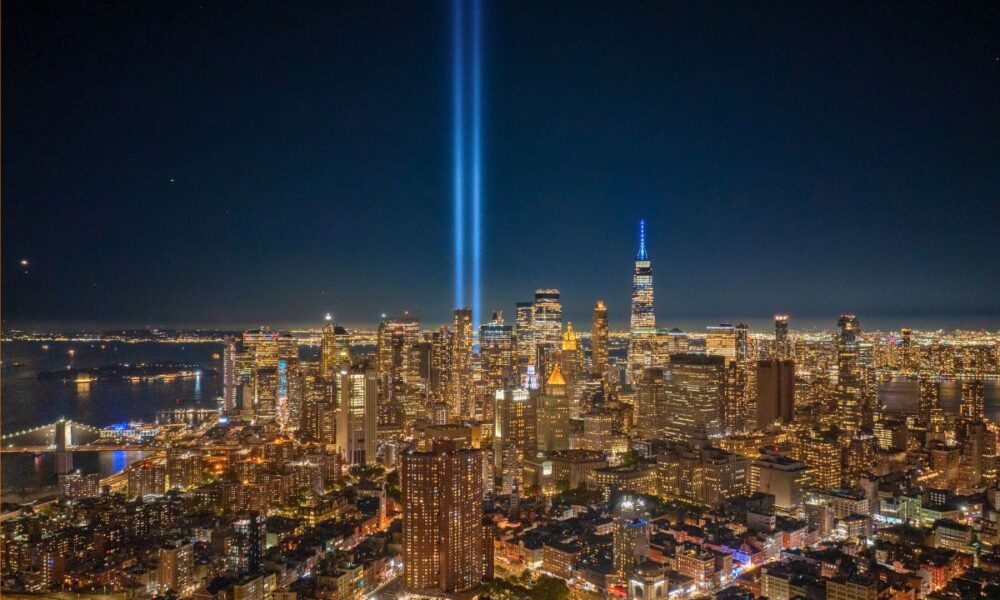Texans stepped up in extraordinary ways 24 years ago today, from airline workers in Fort Worth to first responders, students, and ordinary citizens across the state.
At 8:19 a.m. Eastern time on September 11, 2001, American Airlines flight attendant Betty Ong called her company’s reservations office to report a hijacking aboard Flight 11. Within minutes, that call was routed to American’s operations center in Fort Worth, where manager Craig Marquis realized he was confronting an unfolding emergency. Ong’s steady voice provided the first details of the attack to reach airline officials, who struggled to make sense of events as the crisis escalated, according to the 9/11 Commission Report.
As smoke rose over the East Coast, a team of elite Texas responders rushed to New York City.
Texas Task Force 1, an urban search and rescue unit based at Texas A&M, deployed 74 members to Ground Zero. It was their first federal assignment after joining FEMA’s roster earlier that year.
“I never saw such massive destruction in front of me,” recalled Kem Bennett, who helped establish A&M’s Disaster City training facility. “Seeing that just was overwhelming … but then … your head’s back in the game … and you just do your job,” Bennett said in a Texas A&M interview.
Task Force 1 members worked 12-hour shifts combing through the debris, a mission that stretched their training to the limit and cemented their role as one of the nation’s premier response teams.
Bennett was supported by others such as Chuck Jones, who was then-assistant fire chief in Grapevine, and. Nim Kidd, who helped lead the San Antonio Fire Department at the time.
The tragedy also hit directly at Texas’s largest private employer at the time. Fort Worth–based American Airlines lost two planes in the attacks, including Flight 11, the first to strike the World Trade Center. The Dallas Morning News reported on September 12, 2001, that American executives were “nearly speechless” and “horrified by these tragic events,” as company chairman Donald Carty urged employees to “stay calm and hang together.” For the airline’s 27,000 workers in North Texas, the losses were both professional and deeply personal.
Ordinary Texans also responded with urgency. In San Antonio, blood donation centers were overwhelmed. The San Antonio Express-News reported on September 12 that by mid-afternoon, more than 400 pints had been collected, eight times the daily average. Lines stretched for hours, with some donors marking their place in line on sticky notes as volunteers handed out food and water.
“I was just tired of sitting there and wanted to do something,” said Jean Jacob, a student from La Vernia who drove an hour to give blood. The outpouring surpassed even the response seen after the Oklahoma City bombing, according to officials quoted at the time.
The same spirit could be seen in Dallas, Houston, Austin, and Corpus Christi, where blood centers and donation drives were flooded with volunteers, who at times, reportedly waited 3 hours to donate. In Houston alone, more than 500 donors had given blood by late afternoon on September 11, according to the Express-News.
When President George W. Bush climbed atop the rubble of the World Trade Center days after the attacks, the former Texas governor delivered words that became a defining moment of American resilience. Surrounded by firefighters and police officers straining to hear him through a bullhorn, Bush declared, “I can hear you, the rest of the world hears you, and the people who knocked these buildings down will hear all of us soon.”
The attacks left a profound impact on Texas, a state closely tied to aviation, military service, and national politics. From Fort Worth call centers receiving the first reports of hijackings to the Aggies who dug through the wreckage, and from the Commander-in-Chief who rallied the nation to citizens who waited hours in line to give blood, Texans responded swiftly and decisively.
On this anniversary, their actions remain a reminder of how the state was entwined with America’s darkest day — and how it helped carry the nation forward.


